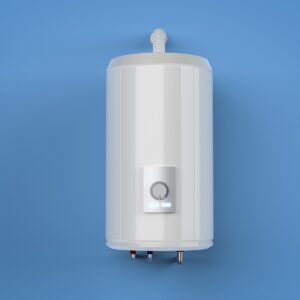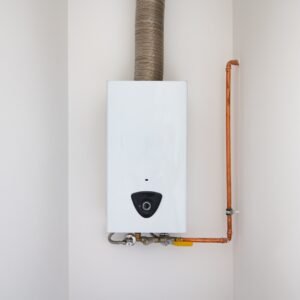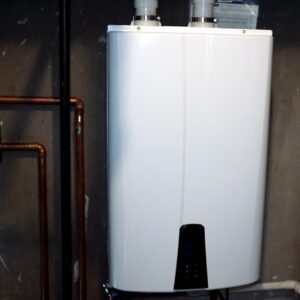10 Amazing Benefits of Tankless Water Heaters
In the realm of home heating and hot water solutions, tankless water heaters have emerged as a game-changer. This comprehensive guide delves into the intricacies of tankless water heaters, exploring their benefits, potential drawbacks, and their fit in modern homes.
Introduction to Tankless Water Heaters
Tankless water heaters, often referred to as on-demand or instant water heaters, have revolutionized the way we think about providing hot water in our homes. Unlike traditional water heaters that store and continuously heat water in a tank, tankless systems heat water directly as it flows through the device, eliminating the need for a storage tank and offering a continuous supply of hot water.
Tankless water heaters, also known as on-demand or instant water heaters, operate under a simple yet innovative principle. They provide hot water only as needed, eliminating the need for a storage tank and the energy losses associated with constantly heating and re-heating water in a traditional tank system. Here’s a breakdown of how tankless water heaters function:
1. Triggering the Heating Process:
- When a hot water tap is opened in the home, the tankless water heater detects the flow of water.
- This flow detection activates the heater.
- As water flows through the unit, it passes over a heating element. This element can be either an electric resistance heating coil or a gas-fired burner.
- In electric tankless water heaters, the electric element heats the water as it passes over it.
- In gas-fired tankless water heaters, a gas burner heats the water. These units typically require venting to the outside.
3. Delivery of Hot Water:
- The water is rapidly heated to the set temperature as it flows through the heater.
- This hot water then travels through your pipes to the open tap.
4. Shutting Down:
- Once the hot water tap is closed, the water flow stops.
- The tankless water heater shuts down, and no energy is used until the next time hot water is needed.
Key Features of Tankless Water Heater Operation:
- On-Demand Heating: The unit only heats water when there is a demand for it, which can lead to energy savings.
- Continuous Supply: Unlike traditional tanks, which can run out of hot water, a tankless system can provide a continuous supply. However, the flow rate is limited, so multiple simultaneous uses can strain the system.
- Energy Efficiency: By heating water only when needed and not storing it, tankless heaters are generally more energy-efficient than traditional tank heaters.
- Space Saving: These units are compact and can be installed in smaller spaces, even on walls, freeing up floor space.
Tankless water heaters, also known as on-demand or instant water heaters, offer several advantages over traditional tank-style water heaters. These benefits range from energy efficiency to space savings, making them an increasingly popular choice for homeowners. Here are some of the key advantages:
1. Energy Efficiency and Cost Savings:
- Reduced Energy Consumption: Tankless water heaters only heat water when it’s needed, eliminating the standby energy losses associated with keeping a tank full of hot water at all times. This can lead to significant energy savings.
- Lower Utility Bills: Due to their increased efficiency, tankless water heaters can reduce the cost of heating water, leading to lower utility bills over time.
2. Continuous Supply of Hot Water:
- Instant and Endless Hot Water: Tankless systems provide hot water on demand and can supply it endlessly, as they heat water directly without the need for a storage tank. This means no more running out of hot water during showers or while running appliances.
3. Longer Lifespan:
- Durability: Tankless water heaters typically have a longer lifespan compared to traditional tank heaters. While a standard tank water heater might last 10-15 years, tankless models can last 20 years or more with proper maintenance.
4. Space Savings:
- Compact Size: Tankless heaters are much smaller and can be mounted on a wall, freeing up valuable floor space in your home. This makes them ideal for smaller homes or apartments where space is at a premium.
5. Improved Water Quality:
- No Tank, Less Scale, and Rust: Since there’s no tank to store water, the risk of rust and scale buildup is significantly reduced. This can lead to better water quality, especially compared to older tank systems where sediment can accumulate over time.
6. Environmentally Friendly:
- Reduced Carbon Footprint: By using less energy, tankless water heaters contribute to lower carbon emissions, aligning with environmentally friendly practices and sustainability goals.
7. Precise Temperature Control:
- Consistent Water Temperature: Modern tankless water heaters allow for precise control of water temperature, reducing the risk of scalding and ensuring comfortable water temperature for various uses.
8. Potential for Tax Incentives or Rebates:
- Incentives for Energy Efficiency: In some regions, homeowners may qualify for tax incentives or rebates for installing energy-efficient appliances like tankless water heaters.
9. Reduced Risk of Water Damage:
- No Tank to Leak: Traditional water heaters can leak or burst, potentially causing significant water damage. Tankless water heaters eliminate this risk, as they do not store large volumes of water.
10. Scalability and Customization:
- Flexible Installation Options: Multiple tankless units can be installed for larger homes or specific applications, allowing for a customized approach to meet the hot water needs of different households.
Tankless water heaters, known for their efficiency and convenience, come in various types to suit different needs and preferences. Understanding the different types of tankless water heaters can help you make an informed decision that aligns with your home’s requirements and energy availability. Here are the primary types:
1. Electric Tankless Water Heaters
How They Work:
- These heaters use electric resistance coils to heat water on demand.
- When a hot water tap is turned on, water flows through the heater, where electric elements heat it.
Pros:
- Energy Efficiency: Electric models are typically more energy-efficient than gas models.
- Compact Size: They are generally smaller and can be installed in more places.
- Lower Initial Cost: Usually less expensive to purchase and install than gas models.
- No Need for Venting: They don’t produce combustion gases, eliminating the need for venting.
Cons:
- Higher Operating Costs: Electricity can be more expensive than gas in some areas.
- Limited Output: This may not provide enough hot water for simultaneous, high-demand use.
2. Gas Tankless Water Heaters
How They Work:
- These heaters use a gas burner to heat water on demand.
- When the hot water tap is opened, the burner fires, heating the water as it passes through the heat exchanger.
Pros:
- Higher Flow Rates: Generally offer higher flow rates than electric models.
- Good for High Demand: Better suited for homes with high hot water demand.
- Energy Cost Savings: Natural gas is often cheaper than electricity, leading to lower operating costs.
Cons:
- Venting Required: Need proper venting for combustion gases.
- Higher Initial Cost: More expensive upfront due to the unit cost and installation requirements.
- Maintenance: This may require more maintenance than electric models.
3. Propane Tankless Water Heaters
How They Work:
- Similar to gas models but use propane as the fuel source.
- Ideal for locations where natural gas is not available.
Pros and Cons:
- Similar to gas tankless water heaters in terms of pros and cons, but with the added requirement of storing and refilling propane tanks.
4. Point-of-Use Tankless Water Heaters
How They Work:
- Small units are installed close to the point of use, like under a sink.
- Designed to serve one or two fixtures.
Pros:
- Immediate Hot Water: Reduces the wait time for hot water.
- Space-Saving: Extremely compact, ideal for small spaces.
- Energy Efficient: Reduces heat loss through long piping.
Cons:
- Limited Use: Only suitable for one or two fixtures.
- Additional Installation: Each unit requires separate installation.
5. Whole-House Tankless Water Heaters
How They Work:
- Larger units are designed to provide hot water for the entire house.
- Installed in a central location and connected to all hot water outlets.
Pros:
- High Capacity: Can handle multiple simultaneous demands.
- Efficient: More efficient than having multiple point-of-use heaters.
Cons:
- Higher Initial Cost: More expensive than point-of-use models.
- Complex Installation: This may require significant plumbing modifications.
Sizing and installing a tankless water heater correctly ensures it meets your hot water needs efficiently and effectively. Here are key considerations to keep in mind:
Sizing Your Tankless Water Heater
1. Determine Flow Rate:
- Calculate Demand: Identify the number of devices you want to use simultaneously and add up their flow rates (gallons per minute, GPM). This includes showers, faucets, dishwashers, washing machines, etc.
- Peak Demand: Consider the peak usage times in your home. The tankless water heater needs to meet or exceed this peak flow rate.
2. Consider Temperature Rise:
- Calculate Required Temperature Rise: Subtract the incoming water temperature from your desired output temperature. For example, if the incoming water is 50°F and you want 120°F hot water, the temperature rise needed is 70°F.
- Climate Factor: Remember that incoming water temperature varies by location and season. Colder climates will require a higher temperature rise.
Installation Considerations
1. Energy Source:
- Electric, Natural Gas, or Propane: Ensure you have the right type of energy source. Gas models typically provide higher flow rates but may require additional venting and gas line modifications.
- Electrical Requirements: For electric models, ensure your electrical system can handle the load. You may need to upgrade your electrical panel.
2. Venting (for Gas Models):
- Proper Venting: Gas tankless water heaters require venting to the outdoors. This could involve installing new venting pipes or modifying existing ones.
- Types of Venting: Direct vent and power vent options are available. The choice depends on the heater’s location and your home’s layout.
3. Space and Location:
- Compact Size: While tankless heaters are smaller, consider the wall space and access for maintenance.
- Indoor or Outdoor Installation: Depending on the model and climate, tankless heaters can be installed inside or outside the home.
4. Plumbing Connections:
- Water Line Adjustments: Your existing water lines may need adjustments or upgrades to accommodate the new system.
- Expansion Tank: In some cases, an expansion tank might be necessary to accommodate pressure changes.
5. Local Codes and Regulations:
- Permits: Check local building codes and obtain necessary permits before installation.
- Professional Installation: Due to the complexity, especially for gas models, professional installation is recommended. This ensures adherence to safety standards and efficiency of operation.
6. Additional Considerations:
- Water Hardness: In areas with hard water, a water softener may be needed to prevent scale buildup in the heater.
- Maintenance Access: Ensure there is enough room for regular maintenance tasks.
Tankless water heaters, also known as on-demand or instant water heaters, have gained popularity partly due to their environmental benefits and energy-saving potential. Understanding these aspects can help you make an informed decision if you’re considering a tankless water heater for your home or business.
Environmental Impact
1. Reduced Energy Consumption:
- On-Demand Heating: Tankless water heaters heat water only when it’s needed, significantly reducing energy wastage associated with keeping a tank of water hot at all times.
- Efficiency: Modern tankless heaters are highly efficient, with many models achieving energy efficiency ratings of 90% or higher.
2. Lower Greenhouse Gas Emissions:
- Less Fuel Usage: By using less energy, tankless water heaters contribute to lower emissions of greenhouse gases, particularly if they use natural gas or propane.
- Electric Models: If powered by renewable energy sources, electric tankless heaters have an even lower environmental impact.
3. Longevity and Waste Reduction:
- Durability: Tankless water heaters typically have a longer lifespan than traditional tank heaters, meaning less frequent replacement and reduced waste.
- Recyclability: Many parts of tankless water heaters are recyclable, further reducing their environmental footprint.
Energy Savings
1. Lower Utility Bills:
- Reduced Energy Costs: The efficiency of tankless water heaters can translate into significant savings on your energy bills. While the savings vary depending on usage patterns and energy prices, they can be substantial over the lifespan of the unit.
2. Only Pay for What You Use:
- No Standby Loss: With traditional tank heaters, energy is used to keep the water hot at all times, leading to standby energy loss. Tankless heaters eliminate this loss, ensuring you only pay for the hot water you use.
3. Rebates and Incentives:
- Energy-Efficient Appliance Incentives: Many governments and utility companies offer rebates and incentives for installing energy-efficient appliances, including tankless water heaters.
Considerations for Maximizing Benefits
1. Proper Sizing and Installation:
- Ensuring your tankless water heater is correctly sized and professionally installed is crucial for achieving the desired energy efficiency and environmental benefits.
- Regular maintenance, such as descaling and filter cleaning, is essential to maintain the efficiency of the heater over time.
3. Usage Patterns:
- The benefits can vary depending on individual usage patterns. Homes with high hot water usage will typically see more significant savings.
4. Source of Electricity:
- For electric tankless heaters, the source of electricity plays a role in environmental impact. Renewable energy sources, such as solar or wind power, can enhance the environmental benefits.
Discover the Future of Home Heating with Plumbing Therapist
As we wrap up our exploration of the 10 amazing benefits of tankless water heaters, it’s evident that this innovative technology is more than just a fleeting trend in home heating. The advantages we’ve discussed – ranging from significant energy savings and endless hot water to compact design and reduced environmental impact highlight why tankless water heaters are an intelligent choice for modern homeowners.
At Plumbing Therapist, we are committed to providing our customers with the best in home comfort and efficiency. We understand that the decision to upgrade to a tankless water heater is not just about immediate benefits; it’s an investment in the future of your home and the environment. By choosing a tankless water heater, you’re opting for a solution that offers consistent performance, longevity, and adaptability to the evolving demands of energy efficiency and sustainable living.
Moreover, the convenience and cost savings associated with tankless water heaters cannot be overstated. The ability to have hot water on demand without the limitations of a tank translates into a more streamlined and efficient lifestyle, not to mention the financial savings on utility bills over time. Plus, with the potential for rebates and incentives for energy-efficient appliances, the switch to a tankless system becomes even more appealing.
At Plumbing Therapist, we pride ourselves on staying at the forefront of home heating technology, offering our customers expert advice, top-notch installation services, and ongoing support. We understand that transitioning to a new heating system can be daunting, which is why our team of skilled professionals is here to guide you every step of the way from selecting the right model to fit your needs to ensuring a seamless installation process.
In embracing tankless water heaters, you’re not just upgrading a household appliance; you’re enhancing your home’s overall efficiency, comfort, and value. So, if you’re ready to leap to a more efficient, reliable, and sustainable way of heating water, Plumbing Therapist is here to help. Contact us today to learn more about how a tankless water heater can transform your home heating experience and to find the ideal solution tailored to your unique needs. Let’s bring the future of home heating into your home today.



